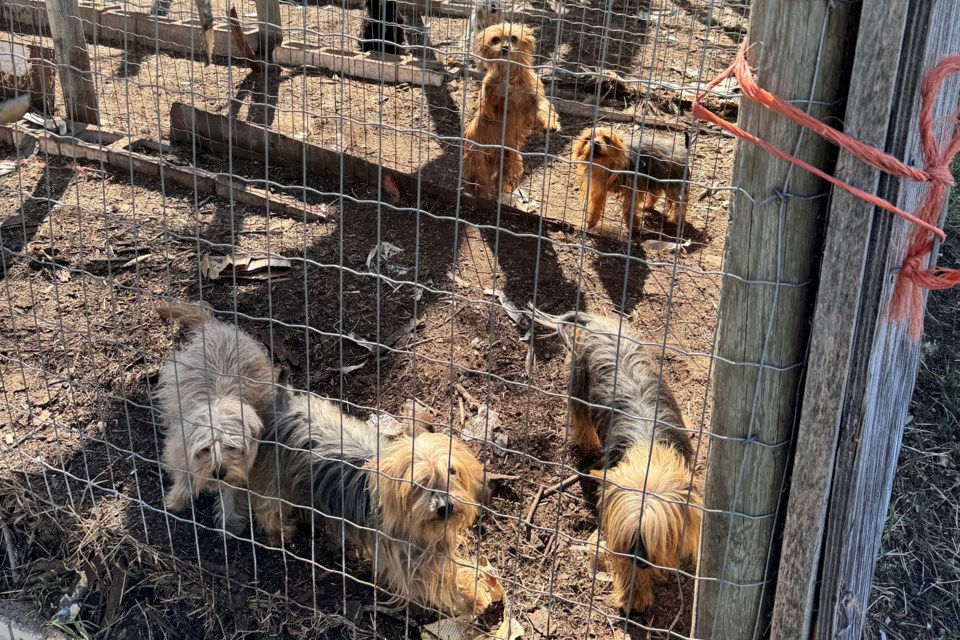The Alberta Society for the Prevention of Cruelty to Animals (SPCA) has its hands full conducting health assessments on dozens of animals following a substantial seizure at a property northeast of Carstairs.
Earlier this week on Tuesday, April 23, RCMP from Didsbury and Airdrie, aided by the Southern Alberta District Crime Reduction Unit as well as the RCMP’s Auto Theft Unit, executed a search warrant on a property in the Didsbury RCMP detachment’s area in Mountain View County.
Along with a gamut of stolen goods found on the property, police also discovered dozens of animals in distress and subsequently seized 56 dogs of various breeds as well as 10 sheep, nine llamas, four chickens and three geese.
Leanne Niblock, Alberta SPCA executive director, offered some insight into the ongoing investigation on Thursday, April 25 during an interview with the Albertan.
“When the RCMP alerted us to the situation, we had two officers attend,” said Niblock.
“They waited until the (police) officers indicated it was safe for our officers to move in to look at the animals,” she said, adding that three SPCA members from Edmonton were also sent down.
In Alberta, the Animal Protection Act outlines the definition of terms such as distress, which can include different situations when officers are making their assessment.
“Our officers can determine an animal is in distress for a variety of reasons,” she said.
“It can be the health and condition of animals themselves, it can be also the conditions the animals are living in; so do they have access to appropriate shelter, do they have access to clean water and food, do they have access to veterinary care and health care,” she said.
“And clearly, when they attended the scene the other day, they determined that animals were in distress and that led to the seizure of the 82 animals.”
Asked if the animals were deemed to be in distress due to their physical condition or the environment they were in, she said, “Our investigation is continuing right now and all of the animals are going through medical attention and care.”
With the sheer number of animals involved, such a process takes some time.
“We’re determining the health and well-being of all of the animals right now,” she said.
“Most likely, in these situations where it’s a high number of animals that are seized, it’s a combination of both” the animals’ physical condition and the environment.
When Niblock spoke with the Albertan, she said when asked that she was unaware of any animals having yet been euthanized.
“With the high number of animals, it’s going to take a little bit for us to do all of the medical assessments with our partners,” she said.
“I can tell you that all of the animals are in our care right now and receiving veterinary attention.”
In response to a question about where so many animals are taken to in these kinds of situations, including larger species such as llamas and sheep, Niblock said the Alberta SPCA works to find shelter with partners throughout the province.
“While we aren’t a shelter – we don’t have animals in our building – we do have animals in our care. So we rely on our partners in the animal welfare community to help us shelter these animals,” she said.
“We’re using different partners because of the high number of animals.”
Companion animals generally go to a number of partner organizations that have animal shelters, she said.
“We also utilize caretakers; so, private citizens who are approved to be caretakers for us, and often we place livestock with them,” she added.
“We pay for them to be in their care,” she said after being asked if the arrangements are at all similar to fostering.
“Where most of the dogs are right now from this last seizure, it costs us upwards of $1,000 a day just for their shelter and care. That doesn’t even include their medical needs right now,” she said.
“We don’t have a foster situation, but we do rely on our partners in the community to shelter and care for our animals that come into our care either through seizure or surrender.”
Part of the investigative process involves SPCA officers presenting the owners of the animals with conditions they’ll be required to meet if they want their animals returned. Those conditions could include reimbursing the SPCA for the cost of providing care for the animals, as well as proving legitimate ownership of the animals.
“If those conditions aren’t met, then after a seizure is completed, there is 10 days that we hold the animals before they become our animals … and we can move them either to partners that will find them forever homes, or in the case of livestock, to people who want to purchase the livestock,” she said.
Anyone who is concerned about the welfare of an animal or animals can call 1-800-455-9003.
“We certainly encourage people, if they believe an animal to be in distress, to call us and we will investigate,” said Niblock.
“We always practise empathy and education before enforcement,” she said.
“Sometimes we get called to site and the animals aren’t in distress and/or maybe there’s a temporary issue happening with the owner and we can help them through that,” she elaborated.
Offering parting thoughts, she also invited anyone who might be so inclined to consider supporting the SPCA’s fundraising efforts.
“While we do get some money from the Alberta government, it certainly doesn’t cover all of our costs,” she said.
“And this spring has been incredibly busy so far and so the entire system is really stretched and feeling the pressure.”



